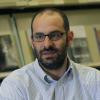
Contact Omar S.
Mail Code CSI
Omar S. Dahi
Franklin Patterson Hall 203
413-559-5392

Mail Code CSI
Omar S. Dahi
Franklin Patterson Hall 203
413-559-5392
Omar S. Dahi is a professor of economics at Hampshire College.
Dahi has previously served in various roles at Hampshire, as faculty trustee, as a representative of the Hampshire AAUP, and as interim vice president for Academic Affairs and dean of faculty.
He is the founding director of Security in Context, a research network on peace, conflict, and international affairs. He has published in academic outlets such as the Journal of Development Economics and Applied Economics, Southern Economic Journal, Political Geography, Middle East Report, Forced Migration Review, and Critical Studies on Security. His last book was South-South Trade and Finance in the 21st Century: Rise of the South or a Second Great Divergence (co-authored with Firat Demir).
Dahi serves as an associate editor of the Review of Social Economy as well as the e-zine Jadaliyya and has served on the editorial committee of the Middle East Report. He is a founding member of the Beirut School of Critical Security Studies within the Arab Council for the Social Sciences (ACSS). Dahi has served as a lead expert on the United Nations Economic and Social Commission of West Asia's National Agenda for the Future of Syria program.
Dahi was born and raised in Syria and currently lives with his wife and two children in Amherst.
This course will review the relationship between the United States and the Middle East since the early 20th century until today. Through a series of guest lectures, readings, videos, and other assignments students will understand the various dimensions of US intervention in the Middle East as well as the various ways that the Middle East has been discussed in US politics and culture. Topics will include the King-Crane Commission, the role of oil in US policy towards the Middle East, US Responses to Arab Nationalism, US-Israeli-Palestinian relations, the US invasion of Iraq, the Arab Uprisings, the role of economic sanctions, the Abraham Accords, among other topics
The term 'multipolarity' is used to describe the significant shifts that have taken place in the global political economy in the last thirty years. Specifically it points to the rise of the economic power of countries such as China and India and the relative decline of US and Western economic power. This seminar will investigate these shifts in order to understand the main structural forces shaping the global economy. Topics will include the rise of China, increasing South-South relations, Sovereign Wealth Funds, Transnational War Economies, Climate Change and Insecurity, the fallout of the US Tariff Wars and other pressing international issues. Students will be expected to keep up with a heavy reading load and complete a final research paper on a topic of their choice relevant to course themes. There are no prerequisites for this course but previous courses in economics, politics, or international affairs are a plus.
What are markets and how are they created and organized around the world? What is the appropriate relationship between society, governments and markets? How can we transform our economic systems to address climate change? What role has racism played in the development of global capitalism and how does it continue to impact economic outcomes? This course addresses these questions by introducing students to a variety of approaches and theories. The course begins with an introduction to core political economy ideas and concepts drawing upon both classical and modern thinkers, and then introduces contemporary themes and debates. We read foundational political economy thinkers as well as debate key questions and problems in the study of political economy.
Economic Development is the process of structural transformation in developing countries, or more simply, the ways that poor countries can become rich. In the course we will survey the theory and practice of economic development since World War II, including such topics as development ethics (e.g. what is development? development by whom and for what?), industrialization, agricultural development, rural-urban migration, and a global Green New Deal including such issues as Climate Reparations. Student research teams will choose a developing country at the beginning of the course to study in depth, applying the ideas discussed in class. The groups will periodically present their research to the class to help us achieve a larger sense of the challenges faced in seeking effective, equitable development.